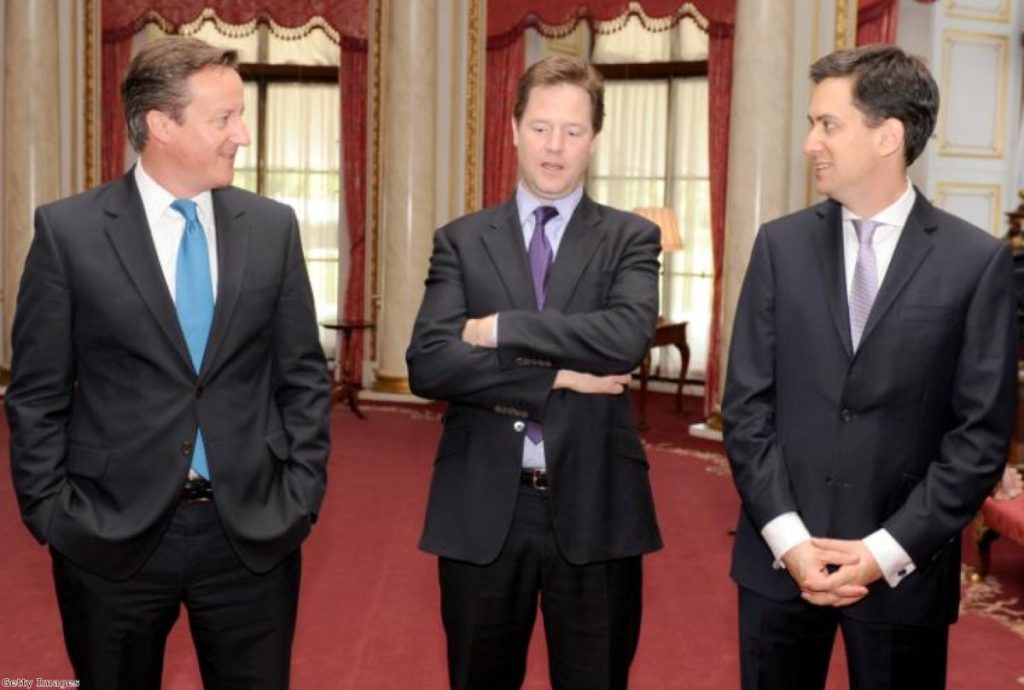Analysis: Clegg’s flawed Labour attack
Nick Clegg's team has had a bright idea: keep repeating the same old message about the economy.
This is viewed as a brilliant idea by those in the Cabinet Office who are paid to come up with clever new ideas to help the deputy prime minister.
So Clegg will buzz off to a Tesco's in West Kensington this lunchtime, where he will deliver the opposite of a groundbreaking new speech to puzzled/awestruck/appalled workers.
It is exactly the same message as that seen in Clegg's speech to his party's autumn conference in Glasgow: only the Liberal Democrats can be trusted to both provide fairness to ordinary people and deliver on economic trustworthiness.


This means that, when it comes to the slowly approaching general election campaign, they have to be equally critical to both their Tory partners in government and the Labour opposition.
It is a balanced approach. You might even call it a fair one. For a party which is now openly plotting to take advantage of another hung parliament by securing five more years of Lib Dems in power, it makes complete sense.
Right now, though, the strategy creates the need for some awkward tactics – an awkwardness reflected in the dubiousness some people will have to Clegg's speech today.
In an ideal world for the Lib Dems their criticisms of Ed Miliband would get equal coverage to those of David Cameron. The problem is the newshounds of the press gallery are naturally more interested in internal rows between the two coalition partners.
So the solution, in order to guarantee coverage of Clegg's hostility to Miliband, is to exclusively talk about the opposition. The deputy prime minister will not hold back.
"Let loose in government on their own they would wreck the recovery – costing jobs, driving up interest rates and undermining the growth needed to cut tax bills and fund public services," he will say.
"They cannot be allowed to undo all of the sacrifices that have been made and everything that has been achieved – the British people would pay the price."
This approach has a big weakness: critics will see in this outspoken attack on the Labour party a natural willingness of the Lib Dems to lean towards the credibility of their economic strategy over fairness.
Being nice to people is a bonus, but not the main thing, it's thought. Ultimately the Lib Dems know which side of the deficit reduction debate they're on.
That is not quite right. Firstly, the Labour party would extend austerity politics just as the coalition would into the next parliament. There never was much of a gap between Labour and the Tories; it was all a question of emphasis, not really ideology at all.
Don't forget that before the 2010 general election, Vince Cable's economic approach was completely balanced. On the one hand, he shrugged, you could cut hard and fast. On the other, you could try and spread the pain a bit more. The Lib Dems couldn't really care less and, in the end, were happy to sign up to one or the other.
We're so bogged down in the paradigms laid out by coalition politics we're forgetting the extraordinary ideological lengths the Lib Dems are prepared to go after the next general election in order to remain in power.
In the meantime, the deputy prime minister will couple his assault on Labour with that repetition of the coalition's austerity defence. In doing so he'll acknowledge there's a need to talk about the issue the opposition earnestly hopes to fight the next election on: cost-of-living issues.
That makes sense because the recent recession was an odd one, with low productivity and suppressed wages helping prevent a repeat of the mass unemployment of the 1980s.
"The issue is much more falling living standards," Clare Short told Politics.co.uk at the end of last week.
"That's the right place to go if you want to talk up to who's hurting – and that's the duty of politicians. It seems to me that people sneered at Ed [Miliband] when he took up energy prices at the Labour party conference. But since then the government's been jumping around and being nervous about it. The political debate is moving on."
This is where Clegg comes in. His response to this shift is to try and drag the debate back to one where the coalition has been winning – on the justification for its spending cuts in the first place.
"The truth is that healthy household budgets flow directly from a healthy economy," he will insist. "The two go hand in hand."
However sage this argument may be, it is unlikely to get much traction with the Tesco workers Clegg will visit today. They will nod their heads when he says it, yes. And then they will go back to wondering what they can afford for dinner.
Whose message will they remember come polling day?
If all the coalition can do is look back to the arguments of 2011 and 2012, their parties will not thrive come 2015.

